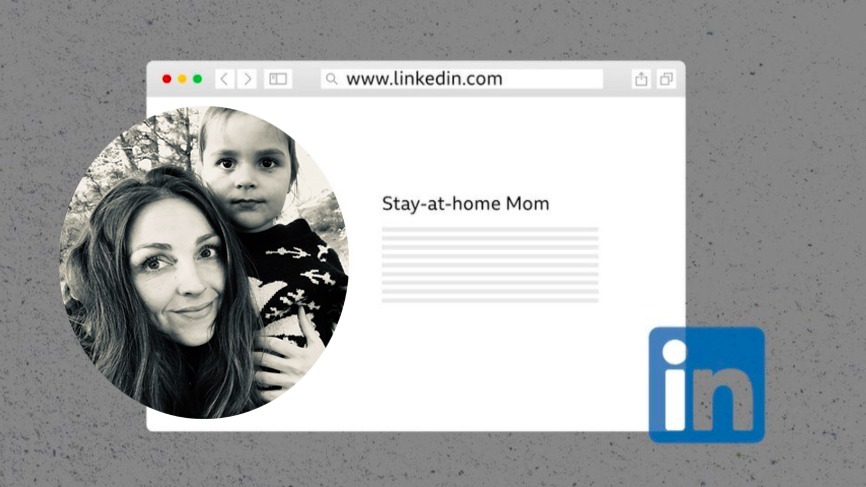Being a parent is one of the most important jobs anyone can ever have. It is an honor and a privilege, and LinkedIn recently added three new job titles to the platform to show how significant the parenting role is.
Those new roles are:
- Stay-at-home mom;
- Stay-at-home dad;
- Stay-at-home parent.
While the roles will never be the first thing on a resume, they deserve recognition. And, LinkedIn adding these new titles will go a long way to normalizing that people can and should be allowed to freely take a career break to focus on being a parent.
The corporate world is cutthroat, fast-paced, and has no appreciation breaks, especially the “unnecessary” ones like the family that could be given up.
LinkedIn hopes that by introducing these new stay-at-home titles, professionals will feel more comfortable explaining their breaks from work for family reasons.
Parents, especially women, have always been penalized and had their careers sidetracked over wanting to take a break to rest and be with their newborns.
Taking time off from work for family reasons is viewed by many as a type of career suicide.
What recruiter or manager would hire someone that could one day up and leave for a child?
That type of question is why a successful career and a happy family life are considered mutually exclusive goals.
Times have changed, and it is high time we changed how we view the issue.
Almost every other break people take from work is celebrated or accepted. But, the moment a parent, which in most cases is usually a woman, wants to take a break to look after their children or family, they are suddenly a liability or inconsiderate for putting the team out unnecessarily.
That is messed up, especially considering that families are the building blocks of society.
Unquestionably, looking after your family deserves a bit more respect.
Compare, for instance, the type of reaction you might get if you choose to go on a sabbatical.
You would be lauded and celebrated for making the bold choice of choosing yourself, and your mental health, and for prioritizing your work-life balance over being shackled to your job.
So, why isn’t the same consideration given to stepping away from work for your family?
It’s worth thinking about, and LinkedIn is boldly taking us there.
But, will the titles change much?
Stay-at-home mom: How practical is the title in the real world?
As great as the intention behind the titles is, their worth should be measured by how practical they are in the business world.
Tracy Saunders, writing for LinkedIn, suggests that employers could find a lot of benefit in considering parents coming back from a stay-at-home break if they believe the potential upside instead of focusing solely on the self-imposed absence from paid work.
In her piece covering how the new titles would normalize the employment gap, Tracy highlights how stay-at-home parents regain many of the skills needed for high performance and productivity that many of us lose because they aren’t appreciated in the corporate world.
These skills include:
- Being an efficient reader of people.
- Having measured emotion.
- Being pragmatically inclusive.
- Having the willingness to trust.
These are but a few of the many skills any stay-at-home parent could tell you they gained during their stint at home.
Another underrated benefit stay-at-home parents bring to the workplace is their ability to hold things together and keep the ship afloat.
Staying at home is a full-time job. It takes a lot of planning, organizing, and managing to keep a household running efficiently and peacefully. Many of the skills involved in running a home are easily translatable to the workplace.
The job also comes with significant stress levels, and the ability to navigate deserves some credit.
Humility, emotional intelligence, and nurturing also form part of the loaded skillset that stay-at-home parents could use to elevate their teammates and colleagues wherever they work next.
That new perspective plugged into an environment starved for compassion, caring, and empathy is what all the dull offices in the corporate world today need.
Be it as a parent or caregiver, there is a lot that our stay-at-home counterparts have to contribute to our work culture that’s long overdue a shakeup. And, it’s time we considered that.
It’s also important to recognize that many stay-at-home parents use their spare time to upskill and improve their knowledge.
Returning from a stay-at-home break is hard work. And, to give themselves the best chance, many parents stay hard at work, learning everything they can to make themselves the most attractive hire they can be.
All that effort and dedication should not be lost on managers and recruiters simply because someone chose to prioritize their family over a paycheque.
Stay-at-home parent: Is that the correct title for you?
So, we know that stay-at-home parents have a lot to add to the workplace, but should you be telling employers about your breaks?
Research shows that employers are two times more likely to call female candidates with no children compared to women that indicated they have children on their resumes.
The fallout of staying at home is not as bad for fathers, but it is clear that employers favor hiring unemployed candidates over candidates returning from stay-at-home breaks.
Shelley Correll, a professor at Stanford and director of the Stanford VMware Women’s Leadership Innovation Lab, thinks using these titles will do more harm than good for stay-at-home parent’s looking to rejoin the workforce.
Her research echoes what we mentioned above about women that have stayed at home for the time being massively penalized and disadvantaged when returning to work. It also shows that fathers that displayed caregiving and parenting as a priority on their resumes faced similar penalties to women, if not worse.
Employers need to move beyond their bias that stay-at-home parents are more committed to family than they are to work or aren’t as competent or cut out for the workplace.
It is a disservice to keep skilled professionals on the sidelines simply because they stepped away to be with family.
Using LinkedIn’s latest job titles might not be the wisest career move, but it would undoubtedly be brave.
If the corporate world is ever going to cave and recognize the importance of taking family breaks, someone must apply the pressure and show that it’s normal and should be encouraged. LinkedIn’s new titles are one way to do just that.
Check out our Ultimate Guide to LinkedIn Marketing to read more about how LinkedIn can be a tool to supercharge your growth.





